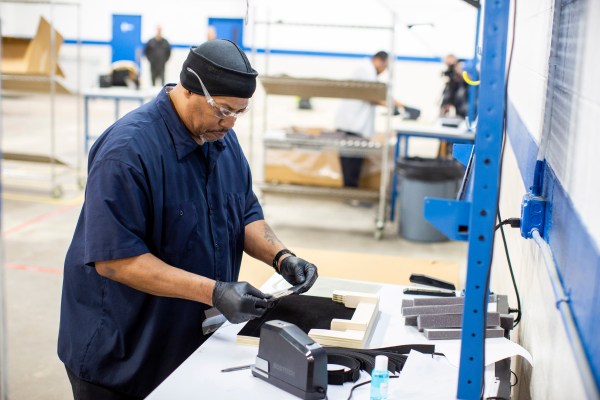Ford announced the details of its current manufacturing efforts around building much-needed medical supplies for front-line healthcare workers and COVID-19 patients. Its efforts include building Powered Air-Purifying Respirators (PAPRs) with partner 3M, including a new design that employs existing parts from both partners to deliver effectiveness and highly scalable production capacity.
Ford says that it’s also going to be building face shields, leaning on its 3D printing capabilities, with an anticipated production rate of more than 100,000 units per week. These are key pieces of personal protective equipment (PPE) used by front-line healthcare staff to protect them against virus-containing droplets that are spread by patients through coughing and sneezing in clinical settings. The company has designed a new face shield, which will be tested with the first 1,000 units this week at Detroit Mercy, Henry Ford Health Systems and Detroit Medical Center Sinai-Grace Hospitals in Michigan to evaluate their efficacy. Provided they perform as planned, Ford anticipates scaling to building 75,000 by end of week, with 100,000 able to be made in one of the company’s Plymouth, Mich. production facilities each week thereafter.
The automaker is also going to be working with GE on expanding production capacity for GE Healthcare’s ventilator, with a simplified design that should allow for higher-volume production. That’s part of a response to a U.S. government request for more units to support healthcare needs, the company said. On top of its U.S.-focused ventilator project with GE, Ford is also working on a separate effort to spin up ventilator production targeting the U.K. based on a request for aid from that country’s government, and it’s also shipping back 165,000 N95 respirator masks that were sent by the company from the U.S. to China earlier this year, since the need for that equipment is now greater back in the U.S., the company said, and China’s situation continues to improve.
Over the weekend, President Trump tweeted that U.S. automakers, including Ford, GM and Tesla, had received the “go ahead” to make “ventilators and other metal products, fast.”
“We have had preliminary discussions with the U.S. and U.K. governments and looking into the feasibility,” Ford spokesperson Rachel McCleery said at the time in a statement to TechCrunch. “It’s vital that we all pull together to help the country weather this crisis and come out the other side stronger than ever.”
Based on this update, it seems like Ford did indeed move quickly to take stock of where it could contribute, and in what capacity. The company will be looking at using both its own and partner facilities to produce this much-needed medical equipment, it said on Tuesday during a press conference call about the announcement, and it’ll also be leveraging existing parts and equipment to speed production capabilities and capacity.
The PAPRs that Ford is building, for instance, will use off-the-shelf components from the automaker’s F-150 truck’s cooled seating, as well as 3M’s existing HEPA filters. These respirators could potentially offer significant advantages in use compared to N95s, since they are battery-powered and can filter airborne virus particles for up to eight hours on a single, swappable standard power tool battery pack worn at the waist. Asked about production timelines and capacity, 3M Global Technical Director Mike Kesti said that they’re still working that out, with a focus on how Ford can supplement existing PAPR production before moving into producing their new version.
“[Ford is] helping us expand the capacity of our existing units,” Kesti said. “So impact will be over the next days and weeks to just increase capacity of our existing [PAPR]. But we’re also working closely together with them to leverage components both from Ford, that they have available, and 3M, particularly our filters that meet the NIOSH [National Institute for Occupational Safety and Health] regulatory requirements, and trying to integrate that into a modified design that will meet the NIOSH regulation performance requirements, and scale it up as as quickly as possible.”
Ford is also assisting 3M with ramping production of its existing N95 respiratory masks, Kesti said.
Ford and GE don’t yet have a timeline, or estimates of production capacity for the new types of ventilators they’re working on either, but the team is “working feverishly to get to the release point,” according to GE Healthcare VP and Chief Quality Officer Tom Westrick.
“We don’t have specific timelines and numbers related to the design and the release of the new ventilators,” he said. “Although, obviously this is of utmost importance to both us and Ford.”

